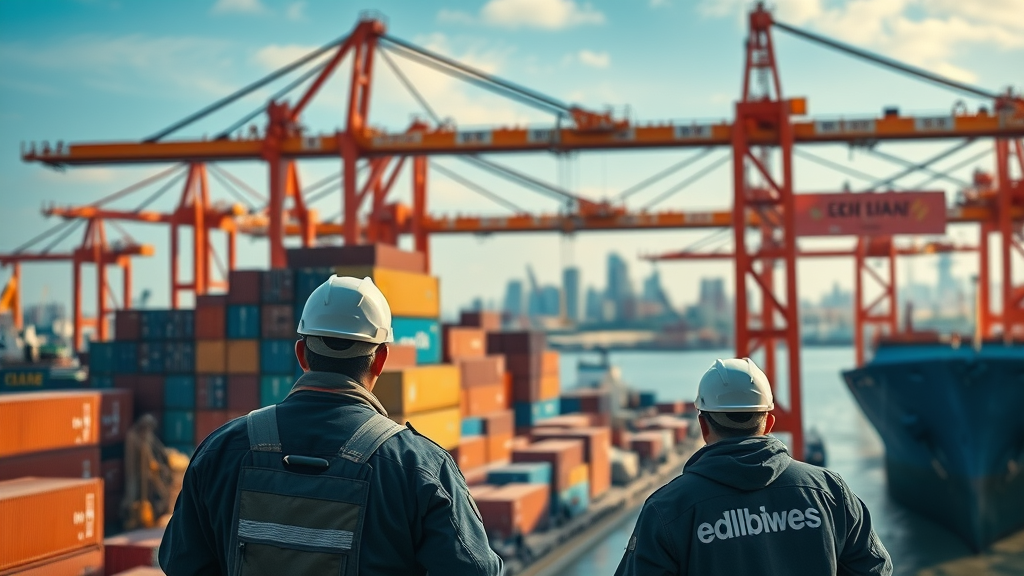Did you know that nearly 70% of international trade fines stem from simple compliance oversights? If your business is trading across borders, a single missed export control can put operations on hold for months—or worse, cost you billions annually through weak trade compliance program execution. Trade compliance isn't just a back-office task—it's your first line of defense against costly financial and operational risks in today’s global market. Read on to learn essential strategies that prevent expensive mistakes and keep your international trade running smoothly.
Startling Facts: Why Trade Compliance Cannot Be Ignored
- Nearly 70% of international trade fines are due to trade compliance oversights.
- One overlooked export control can suspend business for months.
- Billions lost yearly due to weak trade compliance program execution.
“Trade compliance is every business’s frontline defense against operational and financial risk in international trade.” – Industry Expert

Understanding Trade Compliance: The Backbone of International Trade
Defining Trade Compliance for Global Businesses
Trade compliance is the practice of ensuring that a company's trade activities fully adhere to all applicable laws, regulations, and guidelines governing import and export processes across international borders. It involves more than just managing paperwork; it's about establishing robust, ongoing processes that safeguard your business from regulatory risks. Whether your business is shipping components, finished goods, or even technical services, ignoring compliance can disrupt your global trade operations, jeopardize trade agreements, and risk severe financial penalties. Adhering to trade compliance requirements allows for the smooth movement of goods and services between countries, while maintaining a strong reputation with trading partners, customs authorities, and government agencies.
Most multinational companies face the persistent challenge of keeping up with rapidly evolving trade laws , shifting global supply chains, and new compliance regulations. An effective trade compliance program not only reduces operational bottlenecks but also fosters trust with customers and authorities by showcasing your commitment to legal, ethical, and risk-mitigated operations.
Essential Elements of an Effective Trade Compliance Program
A successful trade compliance program is built on clear policies and procedures that guide employees through each step of the import and export process. This begins with understanding all relevant laws and regulations in the jurisdictions where you operate—be it the United States , the European Union, or Asia-Pacific regions. Key elements include risk assessments, internal controls, and regular training sessions for all team members handling international trade transactions.
Proactive trade compliance teams establish rigorous processes to review contracts, screen for compliance with export control laws, maintain up-to-date documentation, and leverage monitoring tools to spot red flags before they become costly mistakes. By dedicating resources to formalize your compliance program, you not only mitigate risk but also build a sustainable foundation for growing your international trade business.
How International Trade Compliance Shapes Today's Markets
In today’s fast-evolving global market, international trade compliance is more than a legal safeguard—it's a competitive advantage. Businesses operating internationally must understand and comply with local and international regulations, such as tariff classifications, import controls, and bilateral or multilateral trade agreements like NAFTA or the EU Free Trade Agreements. Failing to comply can restrict access to key markets, delay shipments, or lead to considerable fines.
Companies that prioritize compliance adapt faster to changes in trade regulations , efficiently manage their supply chain, and take advantage of global opportunities that arise from new trade laws or shifting economic policies. As business leaders recognize the strategic value of compliance, they invest in sophisticated software, dedicated compliance professionals, and regular audits to ensure alignment with the latest international trade standards.

Critical Components of a Strategic Trade Compliance Program
Role of a Trade Compliance Team and Their Key Responsibilities
Every effective trade compliance team is the cornerstone of your compliance program. Their main responsibility is to monitor, interpret, and implement complex laws and regulations governing imports, exports, trade agreements, and customs procedures. This often includes keeping a close eye on updated trade compliance regulations, managing licensing requirements for restricted goods, and advising business units about potential risks or flagged transactions in their supply chain.
The compliance team works closely with legal, logistics, and operations staff to handle day-to-day challenges—from classifying products for export control, to checking customer lists against government watchlists, and ensuring all documentation matches the requirements set by official websites of relevant authorities. By working collaboratively, the trade compliance team keeps the business responsive to regulatory changes and ready to address any compliance issues before they escalate.
Designing an Efficient Trade Compliance Programme
Developing an efficient trade compliance programme begins by clearly defining team roles, creating detailed compliance procedures, and implementing real-time reporting and monitoring systems. This systematic approach allows organizations to proactively manage international trade risks, foster transparency, and avoid last-minute surprises.
- Assign roles within your trade compliance team
- Draft and implement clear compliance procedures
- Develop proactive monitoring and reporting tools
Regular training and scenario-testing are recommended to keep teams sharp and compliant as regulatory landscapes evolve. By embedding compliance into company culture and operational workflows, companies can better anticipate—and navigate—industry- and region-specific export controls.

Export Control and International Trade: Navigating Core Regulations
Understanding Export Control in Modern Trade Compliance
Export control refers to a complex web of laws and regulations that govern the movement of controlled items, technology, or software across national borders. For any business involved in international trade, adherence to export control laws is non-negotiable. Violations can result in criminal or civil penalties, the suspension of trading privileges, or blacklisting in global markets. Compliance professionals must regularly check the official websites of regulatory bodies to stay updated and ensure no product or technology is shipped without the required authorization.
Export control also involves screening customers and transactions to determine if they are listed on any denied parties or restricted entity lists. By embedding export control processes into your trade compliance program, your business can avoid delayed shipments, revoked licenses, or irreversible reputation damage.
Staying ahead of these challenges often requires learning from the experiences of others in the industry. For a practical look at the hurdles new professionals face and how to overcome them, explore the common challenges encountered by new import-export professionals and discover actionable solutions that can strengthen your compliance approach.
How to Align International Trade Policies with Compliance Standards
Aligning your international trade operations with global compliance standards requires harmonizing your internal policies with local and international laws. This includes adapting to updates in international trade compliance standards, such as new tariff codes, changes in import controls , and regularly auditing your export and import documentation.
By leveraging easy-to-access resources—like governmental gov websites, industry association guidelines, and trade agreement texts—you can rapidly update procedures, train personnel, and ensure ongoing compliance. This approach reduces the risk of penalties, maintains credibility with business partners, and opens opportunities for expanding into new trade markets.
| Jurisdiction | Primary Law | Scope | Key Agency |
|---|---|---|---|
| United States | Export Administration Regulations (EAR) | Dual-use items, technology, software | Bureau of Industry and Security |
| European Union | EU Dual-Use Regulation | Goods, technology, software | National Customs Authorities |
| China | Export Control Law | Goods, services, technology | Ministry of Commerce |
| Japan | Foreign Exchange and Foreign Trade Act | Strategic goods, technology | Ministry of Economy, Trade and Industry |
Preventing Common Trade Compliance Mistakes That Lead to Costly Penalties
- Relying on outdated compliance policies
- Inadequate trade compliance training
- Ignoring industry-specific export controls
- Lack of a formal trade compliance programme
“Even a minor lapse in your compliance program can trigger audits, suspended licenses, or significant fines.”

Building and Sustaining an Effective Trade Compliance Team
Recruiting and Training a High-Performing Compliance Team
An exceptional compliance team is essential for proactive international trade compliance. Recruit individuals with backgrounds in trade law, customs procedures, and supply chain management—these skills ensure your team can expertly navigate frequent regulatory changes. However, even the best recruits need specialized onboarding and continuous education tailored to evolving compliance regulations and industry-specific export and import controls.
Well-crafted onboarding programs should introduce new team members to internal processes, expected reporting standards, and real-world scenarios that shape effective response strategies. Ongoing collaboration with logistics, legal, and finance units also helps integrate compliance into all aspects of the business, reducing the risk of costly missteps.
Ongoing Professional Development in International Trade Compliance
In international trade, static knowledge doesn't cut it. Encourage your compliance professionals to pursue ongoing education, such as certifications from recognized bodies and frequent participation in industry seminars. This ensures your compliance team stays ahead of new trade compliance regulations and practices across different markets.
In addition to formal courses, create cultures of continuous improvement by sharing updates from gov and official websites, encouraging attendance at webinars, and organizing peer-to-peer knowledge exchanges. When compliance professionals are equipped with the latest best practices, your company can adapt to new trade agreements, regulatory enforcement trends, and unpredictable geopolitical events with agility.
Optimizing Your Trade Compliance Programme for Continuous Success
Digital Tools and Technologies for Trade Compliance
Modern trade compliance programs benefit greatly from leveraging cutting-edge digital tools. Compliance management software can automate key steps—such as licensing checks, document management, and shipment tracking—which reduces manual errors and speeds up compliance reporting. Automated document control prevents the risk of sending incomplete or outdated paperwork, which is often a leading cause of regulatory fines.
- Compliance management software
- Automated document control
- Real-time customs updates
Real-time customs updates allow businesses to instantly adapt to changing trade regulations and compliance requirements. With integrated digital dashboards, teams receive alerts when laws affecting their supply chain shift or new export controls are enacted, minimizing the lag time between policy changes and compliance action.

People Also Ask: What do you mean by trade compliance?
Trade compliance refers to the adherence of businesses and individuals to the laws, regulations, and guidelines governing the movement of goods, services, and technology across international borders.
Trade compliance encompasses all the practices and processes organizations establish to ensure they follow every applicable law, rule, and protocol when conducting cross-border transactions. This includes adhering to customs procedures, export control laws, and staying updated on evolving trade agreements. Maintaining a compliant operation is vital for preventing issues during customs clearance, ensuring smooth delivery of import and export goods, and avoiding costly legal entanglements.
People Also Ask: What is a trade compliance job?
A trade compliance job focuses on ensuring that a company’s international operations and trade activities comply with all relevant laws, export controls, and regulations.
Trade compliance professionals serve as guardians of global trade within organizations. Their typical activities include monitoring trade transaction data, preparing compliance documentation, conducting internal audits, and liaising with customs brokers or government officials. By understanding the intricacies of various trade regulations, these experts reduce penalties, support supply chain reliability, and safeguard their company’s reputation within the global marketplace.
People Also Ask: What are the three types of compliance?
The three primary types of compliance in international trade are regulatory compliance, procedural compliance, and documentation compliance.
Regulatory compliance entails following applicable trade laws and regulations set by local, national, and international authorities. Procedural compliance means implementing standardized operating procedures to consistently meet these rules across every trade transaction. Documentation compliance requires meticulous record-keeping, ensuring all import and export forms, licensing, certificates, and customs documents are accurate, up-to-date, and audit-ready. Succeeding in all three areas is foundational to implementing a trade compliance program that prevents costly errors and regulatory jeopardy.

People Also Ask: What are the goals of trade compliance?
The main goals of trade compliance are to mitigate risk, avoid penalties, and foster seamless international trade by ensuring every aspect of global operations aligns with regulations.
At its core, the goal of trade compliance is risk mitigation—shielding organizations from penalties, delays, and reputational harm that could stall growth or disrupt supply chains. High-performing trade compliance programs empower businesses to confidently pursue international opportunities, expand into new markets, and nurture relationships with suppliers, clients, and regulatory authorities alike. When companies invest in compliance, they gain a reliable business framework, proactive risk management, and greater competitive agility.
Essential FAQs on Trade Compliance and International Trade
- Why is a compliance program necessary for every international business? Implementing a trade compliance program protects businesses from unexpected fines, shipment delays, and license suspensions—ensuring uninterrupted operations and helping maintain a strong reputation within the international trade community.
- How can organizations stay updated on changing trade compliance regulations? Organizations should subscribe to alerts and newsletters from government, customs, and trade association websites, attend industry events, and provide ongoing training. Building a network of knowledgeable compliance professionals further ensures your practices stay current.
- What documents should be included in a trade compliance program? Essential documents include import/export licenses, customs forms, shipment invoices, product classification certificates, screening checklists for restricted parties, and evidence of compliance training for all employees involved in international trade transactions.
Action Steps to Master Trade Compliance and Safeguard Your International Trade
- Assess your current trade compliance programme regularly
- Empower your trade compliance team with ongoing education
- Leverage technology for improved compliance efficiency
- Conduct periodic audits and risk assessments
“Trade compliance is not just a legal requirement—it is a competitive advantage in today’s global market.”
Summary of Trade Compliance Best Practices for International Trade Success
| Trade Compliance Tip | Description | Potential Impact |
|---|---|---|
| Regular Training | Keep team updated | Fewer compliance errors |
| Document Management | Automate records | Improved audit readiness |
| Export Control Checks | Ongoing verification | Reduce risk of fines |
Unlock Your Edge in International Trade Compliance
“An investment in strong trade compliance delivers guaranteed business continuity and peace of mind.”
Interested in authoring: Call Global Trade News at 203 271 7991
Take action today: Build a resilient trade compliance program, invest in training, and leverage modern tools to secure your international trade future.
As you continue to strengthen your trade compliance strategy, consider broadening your perspective with proven industry best practices. For a deeper dive into sustaining long-term success in the import-export sector, explore our comprehensive guide on best practices for lasting achievement in the import-export industry . This resource offers advanced insights and actionable steps to help your business stay resilient, competitive, and fully prepared for the evolving landscape of global trade.
To deepen your understanding of trade compliance and its critical role in international business, consider exploring the following resources:
-
U.S. Importing and Exporting: Understanding the Basics by C.H. Robinson offers a comprehensive overview of import and export procedures, highlighting the importance of adhering to regulations to avoid penalties and operational disruptions.
-
An Introductory Guide to Trade Compliance by the ICC Academy provides insights into the fundamentals of trade compliance, emphasizing the necessity for businesses of all sizes to understand and implement proper compliance measures to maintain smooth international operations.
If you’re serious about mastering trade compliance, these resources will equip you with the knowledge and strategies needed to protect your business from costly mistakes and ensure seamless international trade operations.
 Add Row
Add Row  Add
Add 




 Add Row
Add Row  Add
Add 

Write A Comment